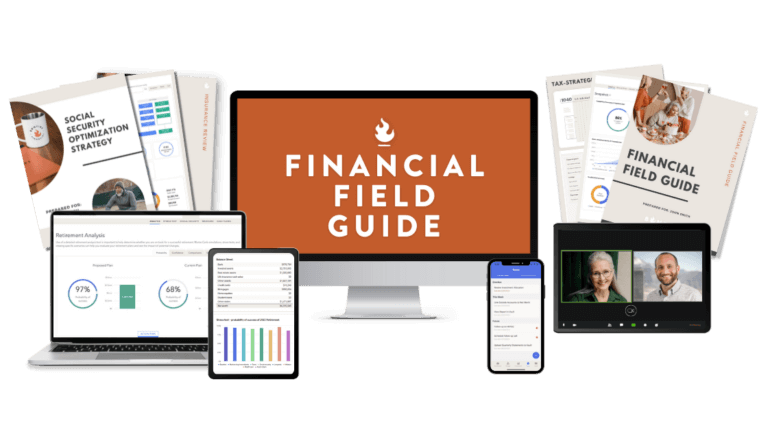If you’re looking for trustworthy financial advice, one term you need to understand is: fiduciary financial advisor. It might sound like industry jargon, but it’s one of the most important distinctions in the financial planning world. Put simply, a fiduciary financial advisor is someone who is legally and ethically required to act in your best interest. Not all advisors are held to this standard, and that difference could cost you.
Today we’ll break down what it really means to work with a fiduciary advisor, how to know if yours is one, and why this matters when it comes to your money, your goals, and your peace of mind.
Listen Now: iTunes | Spotify | iHeartRadio | Amazon Music
What Is a Fiduciary Financial Advisor?
A fiduciary financial advisor is a professional who has a legal obligation to act solely in your best interest when providing financial advice or managing your investments. This means the recommendations they give you must benefit you, not their paycheck. They must avoid conflicts of interest and fully disclose anything that could influence their advice.
That might sound obvious, shouldn’t every financial advisor do that? You’d think so, but unfortunately, many don’t.
Fiduciary in Action: What It Really Looks Like
Imagine you’re working with a financial advisor, and they present you with two investment options:
-
Investment A pays the advisor a higher commission
-
Investment B is nearly identical but pays the advisor much less (or nothing)
Under the fiduciary standard, if Investment B is in your best interest, that’s the one the advisor must recommend, even if it means they earn less. It’s not just about ethics. It’s the law.
That’s a huge deal when you’re talking about life savings, retirement accounts, and generational wealth. But without the fiduciary obligation, nothing stops an advisor from choosing the option that’s more lucrative for them, even if it costs you more.
Why the Fiduciary Standard Exists
The financial services industry hasn’t always had a great reputation. From high-commission sales tactics to conflicts of interest that aren’t always disclosed, the history is… let’s say, complicated. The fiduciary standard was created to protect clients from these conflicts. It’s meant to ensure that when you work with a financial advisor, you’re not just being sold something. You’re being advised, and the advice is in your best interest.
And yet, not everyone is held to this standard.
Wait, Not All Advisors Are Fiduciaries?
Correct. There are three basic types of advisors when it comes to fiduciary duty:
-
Non-fiduciary brokers – These operate under a “suitability” standard. The investment just has to be suitable, not necessarily the best or most cost effective.
-
Hybrid advisors – These can switch hats. In some accounts, they act as fiduciaries. In others, they can accept commissions. That dual role can create confusion.
-
Fee-only fiduciary advisors – These are always fiduciaries. Fee-only advisors typically don’t accept commissions or sales incentives, which helps reduce conflicts of interest.
At Bonfire Financial, we chose to be a fee-only fiduciary firm because we didn’t want to operate in gray areas. We didn’t want to have to switch hats depending on the product or compensation structure. We wanted to build a business grounded in trust, because that’s what our clients deserve.
A Quick (and Real) Story: The Power of a Free Lunch
Let me paint a picture of what it doesn’t look like to act in a client’s best interest.
When I was early in my career at a large wirehouse, there was an informal group I jokingly called “The Lunch Hour Club.” Wholesalers, salespeople for investment products like mutual funds or annuities, would come in and treat advisors to lunch. Think sushi, steak sandwiches, the works!
In exchange? They hoped we’d recommend their products to our clients.
And sometimes, it worked.
Some advisors would literally recommend a mutual fund just because the wholesaler bought them a good meal. They weren’t necessarily bad people. But without a fiduciary standard, there was nothing stopping that kind of behavior.
It drove me nuts.
That experience was a big part of why I left and started my own independent firm. I didn’t want to operate in a system where a sandwich could steer someone’s retirement plan.
Transparency Is Key
Another cornerstone of fiduciary duty is disclosure. If there’s ever a potential conflict of interest, a fiduciary has to tell you. If an advisor owns a stake in a product they’re recommending or will be compensated in any additional way, you have a right to know before making a decision.
That doesn’t mean all commission-based advisors are unethical. Many are great people trying to do the right thing. But even good intentions can be overshadowed by unclear incentives and a lack of transparency.
With a fiduciary, you don’t have to wonder if you’re getting the full story. You are.
Trust Is the Real Currency
At the end of the day, this business is all about trust. When someone comes to us for financial advice, they’re not just asking where to invest. They’re trusting us with their future. Their kids’ college fund. Their retirement. Their legacy.
If you’re going to work with a financial advisor, you need to feel absolutely sure that they’re putting your interests first. That they’ll tell you the truth, even when it’s not convenient. That they’ll say no to a product or strategy that benefits them but doesn’t benefit you.
That’s the kind of relationship that lasts. That’s the kind of advisor you want in your corner.
How to Know If Your Advisor Is a Fiduciary
Here are a few key questions to ask:
-
Are you a fiduciary 100% of the time?
-
How are you compensated?
-
Do you ever earn money from third parties?
-
Are you a CFP®?
-
Will you put that in writing?
If any of the answers feel vague or avoidant, that’s a sign to dig deeper. A true fiduciary will be transparent and direct.
Why We Believe It Shouldn’t Be Optional
The fact that fiduciary duty is optional in parts of the financial industry is baffling. It’s like going to a doctor and not knowing if they’re being paid extra to prescribe a certain medication. You’d want to know, right?
We believe every financial relationship should start with this simple premise: put the client first. Always.
And if that means we make a little less on one decision? So be it. We’re playing the long game. Doing right by our clients has a way of working out.
Bottom Line: Choose Trust Over Hype
There will always be advisors out there chasing commissions, recommending high-fee products, or overpromising results. And there will always be flashy marketing campaigns pushing financial “solutions” that are more sizzle than substance.
But you don’t have to fall for it.
When you choose to work with a fiduciary advisor, you’re choosing clarity. You’re choosing transparency. You’re choosing a partnership built on trust—where your goals, your success, and your future come first.
And that’s how financial advice should work.
Need a fiduciary advisor you can trust?
At Bonfire Financial, we’re 100% fiduciary, 100% of the time. No commissions. No product pushing. Just honest advice built around you. If you want to see what that looks like, we’d love to talk.
 Client Login
Client Login







